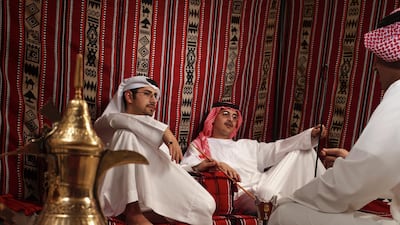I went to an Emirati wake a couple of weeks ago. I had never met the deceased, but I now know that he was loved. I saw it clearly that night in the large majlis, an extension of his stately home in Baniyas.
There were more than 100 men gathered there (the female mourners were in the nearby living room). We sat together, reminiscing about the man’s life.
I was in what's called an azza, an Islamic ritual of empathy where respects are paid to the family of the deceased for up to three days after the burial. This was the first time I had been to an Emirati one, and, as it turns out, the practice is similar to events many other Muslim communities hold across the world.
What happens at an azza?
Each night, members of the extended family or friends will take on the responsibility to set up a space for visitors. Refreshments and, in some cases, dinners are provided. Those paying condolences will come to one of the nights, express their sympathy to the bereaved, and stay for a while. The conversations had are respectful and all mentions of the person who died are favourable.
As I said, in this case I didn’t know the deceased personally – he was an Emirati-Yemeni businessman who succumbed to a long illness – but his sister’s family are close friends, so paying our final respects was natural.
The way it works – at least for male mourners – is, upon entry, you declare in a clear voice "salamu alaikum" ("may peace be with you") to announce your arrival. This allows the other guests to stop their conversation and greet whoever has stepped in. Then you proceed to shake hands with all the people seated in the majlis. When coming across relatives of the deceased, you comfort them by stating "azam Allah ajrak" ("may Allah increase your reward"), before you take a seat.
More than being a religious recommendation and social custom, I found attending the azza to be a deeply moving experience. Where some cultures may find the idea of attending the wake of someone you don't know disrespectful or even macabre, in the Islamic faith the practice is meant to convey a sense of solidarity with the bereaved in their hour of need, as well as strengthen the ties of family, kinship and community.
In my former home of Melbourne, Australia, I went to the azzas of dozens of people whom I had never met, but I was part of their community. My presence, in its own small way, contributed to letting the family know they are not alone.
A moment that is about nothing material
The gatherings also have benefits for those attending. For one thing, it's stripped away of any worldly concerns. This isn't the place to gloat about your successes or air your woes. After all, death focuses the mind on the important things in life.
"He was generous," one elderly man said at this wake. "I am not talking about money, here. Alhamdulillah, he was blessed with that, but he was generous with his time. Any time you needed his advice he was there. He would also call you to follow up on what was said. He was generous with his wisdom and time. May we all be like that."
The people around us all muttered their agreement before another elderly gentleman, who I was later told was the man’s brother, spoke up. He was clearly hurting, but he managed to smile gently as he choked back some of the tears.
“This is indeed the reality, my brothers. May God bless you for talking about the good things he did. Our deeds are all we have left to speak for us after we are gone. The rest is meaningless.”
With that, I walked out, my faith increased. I may not have known him in life, but this man, in death, gave us all a renewed focus on what matters.


